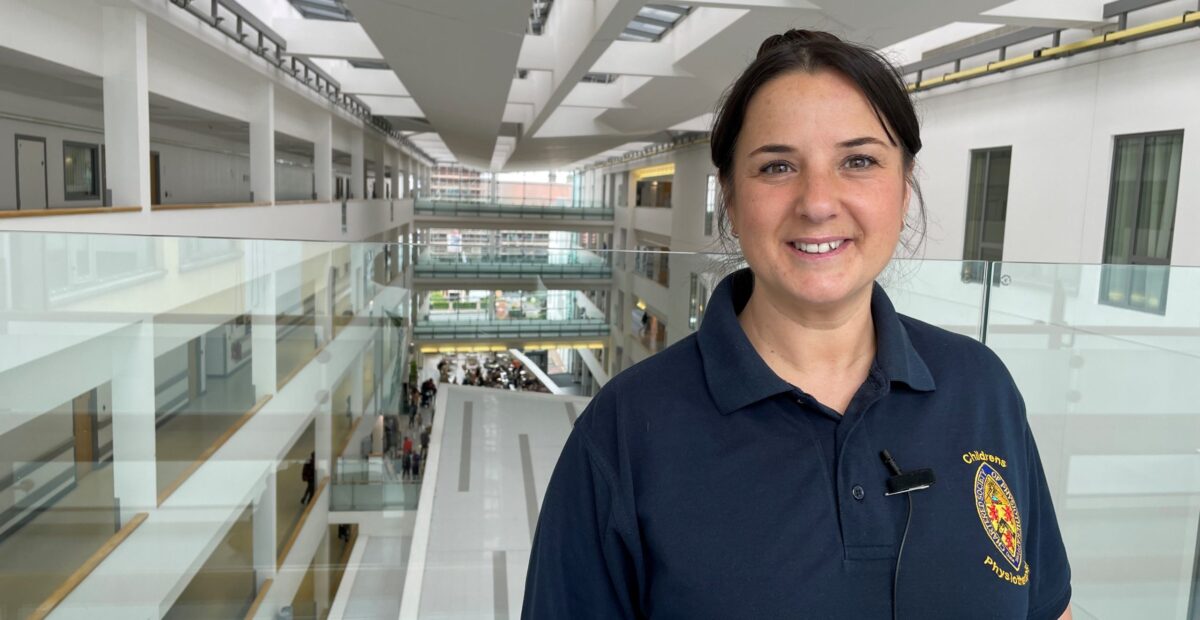Project
The ‘iCanMove’ project is the brainchild of clinical specialist physiotherapist Louise Graham.
Louise and her team work with children and young people with significant functional and mobility problems which are a result of their cancer and treatment. Emerging evidence suggests that keeping these children and young people active from the day of diagnosis, can improve their well-being and physical outcomes.
The aim of the project is to create a proactive physiotherapy service where physical activity and exercise become a mainstay of cancer treatment. This project is planned to be piloted initially on children and young people with acute lymphoblastic leukaemia, with potential to roll out to patients with wider oncology diagnoses and eventually to all children with chronic illness within the Great North Children’s Hospital.
The project and the new post to develop this service is funded by the Sir Bobby Robson Foundation.
Part of the work will be to develop a digital solution in the form of an exercise and activity platform, which will help the team to deliver an inclusive and remote specialist physiotherapy service to all patients, regardless of their postcode, making the programme personalised, safe and accessible for all.
What this means for staff
The project is creating a proactive physiotherapy pathway where the physiotherapy team will work closely with patients diagnosed with acute lymphoblastic leukaemia at the very the start of their treatment.
Encouraging patients to be as active as possible throughout their treatment and goal-setting with them very early on, will help prevent pressures on the physiotherapy team at certain points when they would usually receive an increase in referrals. It will also help to reduce delays in discharging patients from hospital due to mobility difficulties, preventing the need for readmission into hospital for rehabilitation.
How this benefits patients
The aim of the new physical activity pathway and digital solution is to incorporate personalised physical activity and goals from the point of diagnosis and beyond. Evidence suggests this leads to better long-term outcomes for these children and young people, including an improvement in their quality of life and well-being.
Having a digital platform enables children and families to access activity which is goal-led and personalised at any time. The triage feature of the platform will establish whether it is safe for them to exercise and signpost them to their clinicians if they require further discussion, advice or follow up. They can do this without having to travel to attend the hospital or taking more time off school, college or work.
Individuals will jointly agree their physical activity and functional goals with their physio, which could include things like attending school as much as possible, going to a soft play or finding ways to take part in team sports. The platform will support them to work towards their goals in the best way.
Patients are more likely to engage and continue with the platform and work towards their goals if it is introduced at the start of their treatment. They will hopefully create good habits and recognise physical activity as an integrated part of their cancer treatment, alongside their chemotherapy, radiotherapy and other elements.
How we helped
Louise was awarded a place on the NHS England Clinical Entrepreneur Programme in 2021 with her digital platform design and she continues to access support and mentorship from the programme for her project.
Our innovation business manager Charlotte has supported Louise with the project, including stakeholder engagement via a questionnaire, contracting expertise, developing a prototype and collaborating with partners.
Louise was also matched with a mentor, who is a GP with experience of developing a successful health-related app. The mentorship has provided invaluable guidance and direction for her innovation and objectives, as well as encouragement to write the business case for the charity-funded post and protected non-clinical time to allow for its development.
Next steps
Louise has recently collaborated with a physiotherapy colleague from Sheffield Children’s Hospital and the team behind a children’s cancer digital platform to develop the exercise and physical activity element of the platform.
Funding has been obtained via the National Institute of Health Research (NIHR) to begin the pilot study with the children and young people at the Great North Children’s Hospital.
What would you say to colleagues who have an idea to develop?
“If you have an idea or innovation that you truly believe in, then don’t ever give up!
“Sometimes I have to look back to see how far I’ve come. A few years ago I would never have believed that we could get to where we are today.
Go out there and find the support you need. I can’t thank Charlotte Fox and the trust innovation team, the NHS Clinical Entrepreneur Programme and my line managers enough for the guidance, support and encouragement they’ve given me for my vision.
I’m determined to improve the outcome and quality of life for children with cancer and no amount of imposter syndrome is ever going to stop me from doing that now.”

